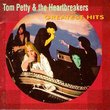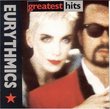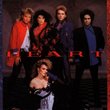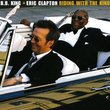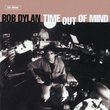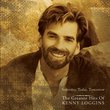| All Artists: John Fogerty Title: Blue Moon Swamp Members Wishing: 0 Total Copies: 0 Label: Warner Bros / Wea Original Release Date: 5/20/1997 Release Date: 5/20/1997 Genres: Country, Pop, Rock, Classic Rock Styles: Americana, Roots Rock, Southern Rock, Album-Oriented Rock (AOR) Number of Discs: 1 SwapaCD Credits: 1 UPCs: 093624542629, 093624542643 |
Search - John Fogerty :: Blue Moon Swamp
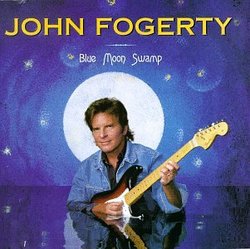 | John Fogerty Blue Moon Swamp Genres: Country, Pop, Rock, Classic Rock
Former Creedence Clearwater Revival leader Fogerty's first album since 1986's broodingly flat Eye of the Zombie, '97's Blue Moon Swamp finds him returning to the roots-rock ways of his old CCR glory days. Deceptively rela... more » |
Larger Image |
CD DetailsSynopsis
Amazon.com Former Creedence Clearwater Revival leader Fogerty's first album since 1986's broodingly flat Eye of the Zombie, '97's Blue Moon Swamp finds him returning to the roots-rock ways of his old CCR glory days. Deceptively relaxed in the Creedence manner, this collection seeks to evoke the mood and tone of Southern swamp blues, with generally successful results. Highlighted by rockabilly-tinged tunes like "Southern Streamline" and "Hot Rod Heart," the album's clear standout track is "One Hundred and Ten in the Shade," on which Fogerty, ably backed by gospel vocal group legends the Fairfield Four, uncannily reconstructs the sound of Southern field hollers. --Billy Altman Similarly Requested CDs
|
Member CD ReviewsReviewed on 9/13/2006... Fogerty still has the great voice we love from CCR music.
CD ReviewsReturn of the Legend Kevin L. Nenstiel | Kearney, Nebraska | 04/30/2001 (5 out of 5 stars) "Creedence Clearwater Revival, the quartet that gave us such classics as "Down On the Corner" and "Proud Mary," cranked out three albums in the year 1969. In this day, when we've grown accustomed to artists sometimes going as long as six or seven years between albums, this seems staggering. It's even more staggering when you consider that CCR's lead singer and songwriter, John Fogerty, hadn't released an album in eleven years prior to Blue Moon Swamp.Fogerty has been one of the overlooked voices of a generation. His eloquent blues on songs like "Wrote a Song For Everyone" exceeded the description of the emotions of the hippie generation we remember from bombastic groups like The Doors. Where Jim Morrison declared, "We want the world and we want it now," Fogerty and CCR sang, "I saw the people standing a thousand years in chains. Somebody said it's different now, but look, it's just the same." This may be less likely to grab the ears of listeners, but it was more moving to a generation that was searching for a standard of hope and vision.But that generation is no longer composed of youth in search of an identity, oppressed by the system. The Baby Boomers ARE the system. Members of the generation dominate politics, technology, culture, and anything else you can name. Does John Fogerty, the Willy of the Poor Boys, still have something to offer the world in this environment?Absolutely. Perhaps the epitomy of growing old gracefully, Fogerty embodies the spirit of youth in a man his age (he was 51 when he recorded Blue Moon Swamp). However, he's no longer singing about how he ain't no fortunate son or how he remembers the bayou. He's facing the world as an adult, a strong voice for maturity with sophistication and style.This album with which he celebrates this maturation is a strong, evocative piece. Don't take my word for it, however. In 1997, the Denver Post compiled lists of the ten best albums of the year for rock, country, blues, and classical music, each by a different critic. This album was on all the lists except classical. Moreover, after failing to garner the coveted award for years, this album won Fogerty his first Grammy as a musician. If the critics love it, it must not be too bad, right?Starting with the song "Southern Streamline," about the wanderlust we go through at least once in our lives, Fogerty grabs the listener with a blues-based force that was not much in evidence on his last album, the critically panned Eye of the Zombie. Other songs, like "Hot Rod Heart," about a man who feels a need for speed, and "Bring It Down to Jelly Roll," about dancing being panacea, are strong and enjoyable. It seems Fogerty's eleven years of navel-gazing weren't wasted -- the blues basis that propelled the popularity of CCR is back in evidence.The album isn't perfect. There are a couple of pieces of filler material, particularly the song "Rattlesnake Highway." There's no strong single off the album, which is why it didn't get the kind of commercial success it deserved. However, as the relative success of the album indicated, it's strong enough to support itself on its merits and the name of the artist.Fogerty himself makes some wise choices. Unlike his previous two outings, the good but flawed Centerfield and the commercial failure Eye of the Zombie, he exerts limitations on his great instrumental ability. On the other albums, Fogerty played many instruments himself, but on this one, he sticks to his strength, playing the guitars, and only the guitars. This includes the masterful steel guitar on "Bring It Down to Jelly Roll" and dobro on his paean to his wife, "Joy of My Life."This song is possibly the masterwork of the album. Its country-blues tone is reminiscent of CCR's "Looking Out My Back Door" or Fogerty's solo debut, the bluegrass Blue Ridge Rangers. Where many artists become enrapt in a strong style and repeat themselves, however, Fogerty tinges this song with a jazz undertone and mixes in a syncopated drum line that keeps it lively and inventive.Nor is this the only strong song in a traditional vein. Perhaps the greatest tribute to Fogerty's awareness that he isn't a kid anymore is "Hundred and Ten in the Shade," a blues in the style of Muddy Waters, backed with the gorgeous vocals of gospel team The Fairfield Four. He sings of working hard, getting tired, and begging to be carried away from the misery. Fogerty knows he's getting old, but he's managed to maintain the vitality of youth with a grace we could all long to emulate.Fogerty maintains his importance to the Baby Boom he helped voice, not by pretending he's still a kid as many of his peers do, but by showing it's possible to accept aging and even imminent mortality with grace. He indicates that it's possible to maintain the vibrancy and spirit of youth as one ages, without having to resort to childish antics. Life remains worth living in the face of death, joy is to be had in the presence of pain, and youth can be retained without being juvenile. These are messages too few are willing to broadcast -- and messages Fogerty embraces with a passion most of us can only long for. When we're all his age, may we all be as joyful and alive as John Fogerty is." A Real Gem-It Just Doesn't Get Any Better! Sam Bethune | Lincoln, Nebraska USA | 01/18/2001 (5 out of 5 stars) "Blue Moon Swamp is, to my thinking, a breakthrough album of sorts. John Fogerty stopped making records after the somewhat uneven Eye of the Zombie about 12 years before, and with this CD he is back and better than ever.The best track on this disc, by far, is Hundred and Ten in the Shade (for which Fogerty taught himself to play dobro). You can practically feel the sweat dripping off of your body when you listen to it. Blue Boy and Bringing It Down to Jelly Roll (the latter a tribute to Jelly Roll Morton) are also worth a listen. And then there's Joy of My Life, a great love song written by Fogerty for his wife which features a first rate dobro solo.In many ways, this is Fogerty's best solo recording and one of the most polished collections of songs ever released by any artist. As I recall, it won a well deserved Grammy for record of the year in the year of its release, and after one listening you'll instantly know why."
|

 Track Listings (12) - Disc #1
Track Listings (12) - Disc #1